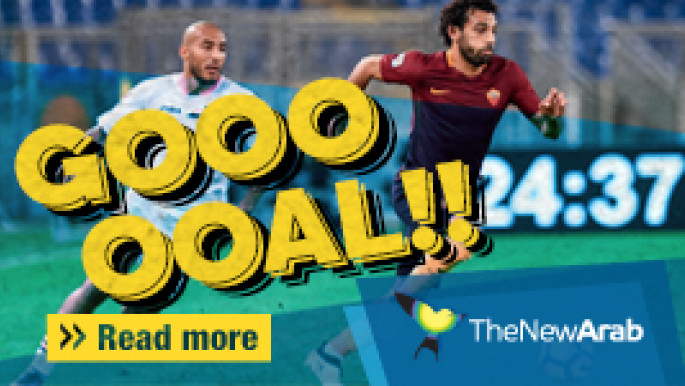
Palestine chief's FIFA ban sends shockwaves: This week in Middle East football
Fans from Jerusalem and Tulkarem gathered in the historic Faisal Husseini Stadium for the West Bank Supercup match - the first competitive clash of the 2018/19 season in Palestinian football.
The stadium has recently been renovated. A 12,500-seater, with red and white chairs creating the word "Palestine" in Arabic in the eastern stand. Faisal, as the locals call the arena, has seen Palestine's most famous moments of football throughout recent years: a World Cup qualifier in 2013 against Afghanistan, another against the United Arab Emirates featuring Amoory Abdulrahman in 2015 - not to mention West Bank cup finals and league survival battles for the Jerusalem clubs - just part of the history this place has witnessed.
But this Monday, Faisal was nearly empty. Only 200 fans made it to the match in the shadow of the most recent scandal to hit Palestinian football and politics - the ban that FIFA imposed on Palestinian FA President Jibril Rajoub.
Last week, the FIFA disciplinary committee decided he had to go, after his "inciting comments", towards FC Barcelona footballer Lionel Messi and the Argentinean national team. Rajoub had sparked a global protest against a friendly game between planned to take place in Jerusalem between Israel and Argentina.
After the match was cancelled and the saga seemed to end with dramatic public relations damage to Israel - Israeli Culture Minister Miri Regev was widely condemned for the debacle - FIFA decided that Rajoub should get a 12-month ban from official football matches and a 50,000 CHF ($52,000) fine.
Twitter Post
|
He will, however, still be allowed to run Palestine's Football Association.
The Palestinian FA want to appeal the decision, saying Rajoub had said nothing inflammatory.
In the decade since Rajoub took over Palestinian football, the game has developed and grown extensively in the occupied territories. From an amateur basis on sand pitches it has grown into to a professional/semi-professional league played on turf, with sponsors, crowds and a talented national team.
In 2015, the national team first took part in the Asian Cup. Next January, Palestine will again play - this time in Group B against Syria, Jordan and Australia in the 2019 Asian Cup held in the UAE. If the situation remain as is, Rajoub won't be there.
The new season in Palestine kicked off with a thriller between the past season's champions, Hilal Al-Quds, and cup-winners Thagafi Tulkarem.
 |
|
| Catch up with all our football coverage |
The new turf at Faisal was shining as both teams battled mainly in the centre of the field, but the game opened up in the second half. In the 49th minute Dad Ghazali scored for Hilal, and it seemed that the team that had won five titles in the past two seasons were set for glory once more. But Thagafi had other ideas.
The Anabi ["the grapes"] kept the pressure up until Usama Sabah struck a free kick that hit the hand of one of the defenders, and Thagafi were awarded a penalty. Sabah converted, and with 10 minutes to go, the scoreline was 1-1.
Three minutes later, Hilal went on the counter-strike, and with an astonishing passing play of 12 passes, Ali Naameh found the back of the net off the post and the few Hilal fans in the stands went crazy. The Supercup was theirs.
Since the 2010/11 season, Jibril Rajoub has handed over every trophy that has been won in Palestine - championships, cups, supercups, league cups - all of them. This Monday was the first time a trophy was handed to winning players by association administrators.
How his absence will affect Palestinian football is not yet clear, but one thing is sure - dauri al-mukhatriphin is up for another fascinating season, on and off the pitch.
Uri Levy runs the popular football blog BabaGol, which covers football and politics focusing on the Middle East. Follow him on Twitter, and read his blog here.
![palestine football [getty] palestine football [getty]](/sites/default/files/styles/large_16_9/public/media/images/E4310004-12FE-4F98-8D3C-8EE28701B177.jpg?h=d1cb525d&itok=Ijafqj4D)



